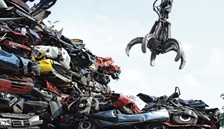By Philip Nothard, CAP retail and consumer valuation editor
My previous article looked at pre-registration as on of the most frequently discussed method of stimulating the market, but now the focus switches to scrappage.
When this was last tried, the result was the scrappage and replacement of approximately 400,000 vehicles. The issue has now been brought back to the fore, as reported in AM in June, when Carlos Tavares from Renault said he would like to see the reintroduction of a scrappage scheme across Europe.
The bald numbers (revealed in the chart below) show an increase in registrations during the 2009/10 scrappage period of 239,578 over the same period pre-scheme. Post-scrappage, registration figures fell by 183,987. So in return for a £400m public investment, there was a 14% boost in new car sales.
Was it worth it? The answer depends on who you are. I am specifically interested in dealers’ views of scrappage and whether they would like to see it again, given the challenge of consumer confidence in a long recession.
General opinion divides roughly evenly between those who thought it was a great success for the motor industry and those who believed it did more harm than good, that it shouldn’t have been run in the first place and should never return. Only a small minority said it was right for the time but should not be repeated.
Independent specialist Jim Reid Vehicle Sales articulates one side of the argument in this way: “The winners of scrappage are the manufacturers, as they shift metal at list price, and the Government because it generates more income via VAT.
The losers are the nearly new car dealers. They cannot compete as they can’t give £2,000 part-exchange on a car worth £150. Conversely, the price to change for the customer may well be – and normally is – still cheaper. Dealing at falsely high list prices and artificial part-exchange prices only produces short-term gains, and actually selling cars becomes a second priority as order-taking becomes the norm.”
Another view through my research came from Stephen Brighton, MD of Hepworth Honda: “I would prefer manufacturers to continue introducing new models to stimulate the market rather than artificially boost it short-term as this will give sustainable and profitable longer-term growth to both manufacturers and dealers.”
So much for stimulating new car sales. What about the cars that were scrapped as a result? Nobody would object to removing unroadworthy, high-polluting cars from our roads, but what of the ‘little old lady’ cars that smaller independent dealers rely on? Was it right to destroy cars which were never going to be driven enough for their poor CO2 ratings to make an impact on the environment? Plenty of those scrapped cars could have been generating profit opportunities for small dealers and giving new owners perfectly good service for many years to come.
What of the arguments in favour? Among the winners were those people who could suddenly afford a new car that was out of reach before. There were short-term gains for dealers who took full advantage of the scheme. The manufacturers who sold more units were winners and so was the tax man. But anyone who thinks more low-CO2 cars in use is environmentally beneficial has not done the maths around the raw material and energy costs of building these new cars.
Past experience suggests a scrappage scheme is probably not the most effective tool to support a hard-pressed British industry sector through tough times.
















LINGsCARS.com - 16/10/2012 15:27
Utter idiocy to bring this back. Not only did many lovely old cars get scrapped, including future classics, but it was a knee-jerk Jam Today, Rob Peter to Pay Paul strategy. It was environmental madness. Taxpayer funded party for car manufacturers. The UK ended up shipping UK taxpayers' £££millions to South Korea, remember? Kia and Hyundai sales went through the roof. Insane. Lunacy. And. Mentalism. ...by vested interests. This stinks of corruption. Ling